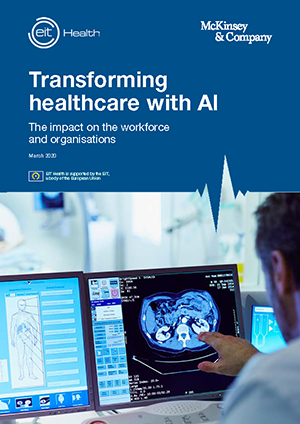News • Transforming healthcare
AI: The impact on the workforce and organisations
EIT Health and McKinsey & Company have published a Europe-wide report “Transforming healthcare with AI: The impact on the workforce and organisations” exploring the impact of AI on healthcare practitioners, as well as the implications and obstacles for scaling AI in healthcare organisations and systems.

A new report from EIT Health and McKinsey & Company has exposed an urgent need to attract, educate and train a generation of data literate healthcare professionals, whilst up-skilling the current workforce if we are to fully realise the transformative potential of Artificial Intelligence (AI).
The report, which is based on a bespoke body of research, explores the impact of AI on the future of European healthcare and its workforce. Additionally, it highlights the need to define new organisational models and skillsets that healthcare professionals will need to support the adoption and scaling of AI, and outlines the new types of talent that will need to be attracted.
The report found that basic digital skills, biomedical and data science, data analysis, and the fundamentals of genomics will be critical, if AI and machine learning is to penetrate healthcare services. “These subjects are rarely taught alongside traditional clinical sciences systematically,” explains Jorge Fernández García, Director of Innovation, EIT Health and co-author of the report. “And so through no fault of their own, today’s healthcare workforce is simply not yet equipped for the adoption of AI.”
The incentives for healthcare systems to embrace these changes are clear. The WHO estimates that by 2030 the world will be short of 9.9 million doctors, nurses and midwives, which adds further urgency to address the challenge of already overburdened health systems. Supporting the widespread adoption and scaling of AI could help alleviate resource capacity shortfalls both now and in the future, for example, by streamlining or even eliminating administrative tasks which can occupy anything between 20 and 80 percent of a healthcare professional’s time.
At present, diagnostics is the main application of AI within healthcare. However, in the next 5-10 years, healthcare professionals expect clinical decision making to top the list of applications according to the survey.
Jorge continues, “Being at the forefront of healthcare innovation in Europe, we are seeing an increasing number of tangible, impactful and exciting AI solutions created. However, we must couple the generation of new technology that can relieve some of the pressure on healthcare services, with the ability for it to be integrated into care delivery. Now is the time for us to address the gaps, so that Europe does not fall behind in the application of AI”.
Besides upskilling, better involvement of healthcare professionals in the early stages of AI development was also identified as a key need. Currently 44 percent of those surveyed, chosen for their interest in healthcare innovation and AI, had never been involved in the development or deployment of an AI solution.
Dr. Angela Spatharou, Partner at McKinsey & Company, and report co-author comments: “AI has enormous potential to improve productivity and efficiency in health systems and make them more sustainable – but more importantly, it has the potential to deliver better health outcomes for patients. It can do so in many ways, from enabling more preventive care, to allowing healthcare practitioners to spend more time on direct patient care. This joint report provides guidance for decision-makers to define their level of aspiration on AI and develop and implement the right approach for their organisation or health system”.
During interviews with decision-makers urgency in developing and scaling up training was emphasised, as was the suggestion that national health systems should work together with healthcare professionals, academia and industry in order to support healthcare providers, in particular those who are not large enough to deliver such programmes alone. They also emphasised the importance of ensuring AI is ethical, transparent and trustworthy.
The report, which included a survey of 175 people on the frontline of healthcare delivery and interviews with 62 decision makers, was complemented by macroeconomic analyses of the Future of Work for European healthcare systems from the work of the McKinsey Global Institute (MGI).
It provides a unique view on the state-of-play and prospects of AI for healthcare in Europe, covering areas including: strengthening data quality, governance, security and interoperability, implementing a robust change management strategy, addressing issues around regulation, policy-making and liability, redefining funding and reimbursement models and criteria for investment, and designing how disciplines can work better together to improve quality.
View the report here: https://eithealth.eu/our-impact/our-reports/
Source: EIT Health
16.03.2020










